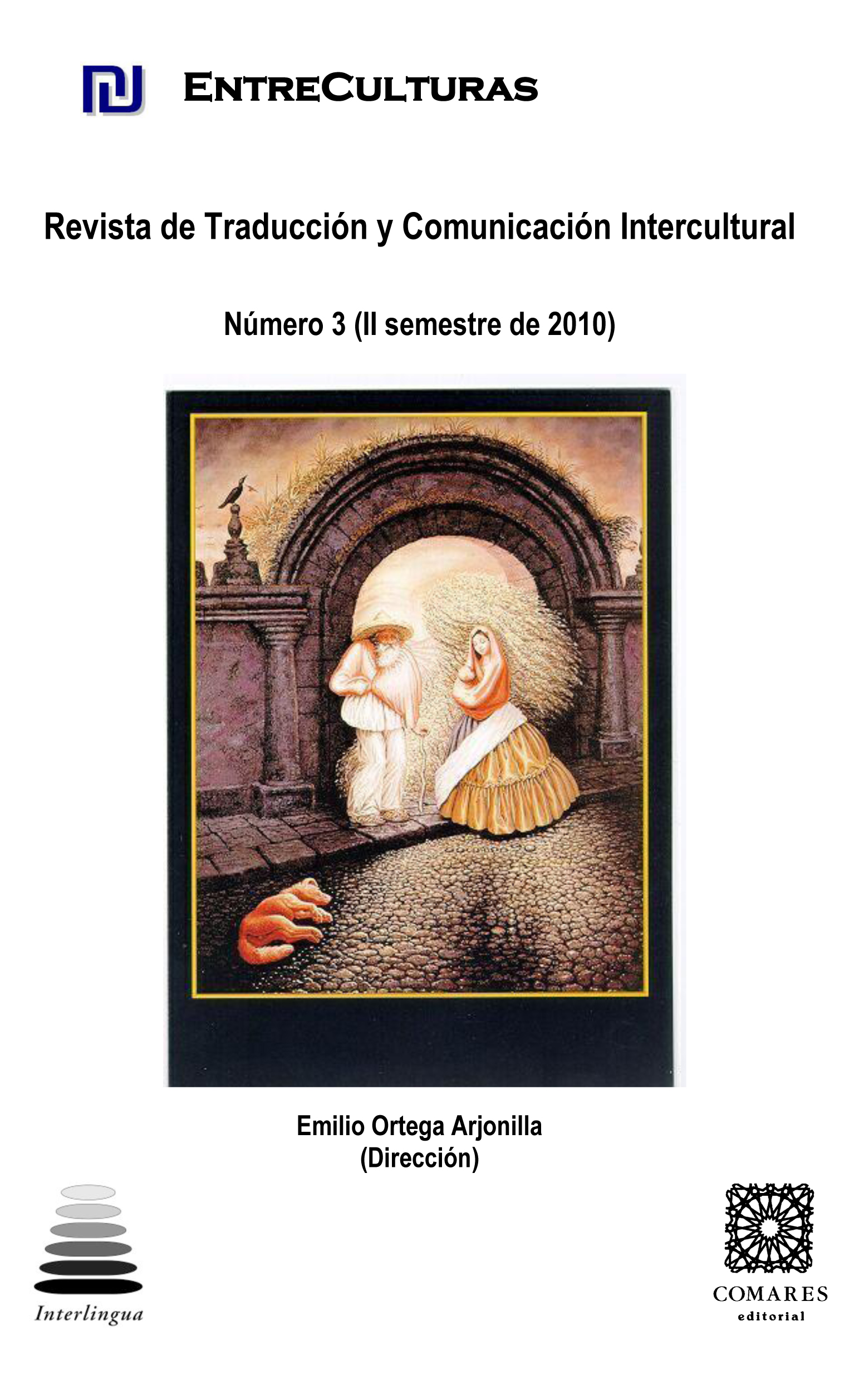ALBERTO LISTA: AN ANGLOPHILE PIONEER IN SPANISH TRANSLATION
DOI:
https://doi.org/10.24310/Entreculturasertci.vi3.11753Keywords:
Translation, English Poetry, Spanish Enlightenment, Multiculturalism, Alberto Lista, Alexander Pope, Elizabeth Carter, John Bowring, Sevillian translatorsAbstract
Alberto Lista is a pioneering figure in Spanish literary translation. A multicultural figure of the eighteenth century, he was instrumental in the creation of a literary group in Seville that looked to English literature at a time when the majority of Spanish writers were drawing on French inspiration. A product of the European Enlightenment, his literary legacy includes poems of his own, works translated from other languages as well as versions that were inspired by themes appearing in foreign literature. Lista, educated in the aesthetic doctrines of P. André, Batteux, Marmontel, and Blair, turned to a reflective poetry of carefully-crafted words and sublime rhetoric. The translated poems show us a passionate love of philosophical and cosmopolitan poetry akin to the verses of Meléndez and Cienfuegos. He was the first poet to translate both Milton and Alexander Pope, into Spanish, and at a time when the translation of poetry from foreign sources was seen as essentially a worthless exercise, he and the Sevillian group represent a new beginning in Spanish culture, preparing the way as they did for later writers such as Belmonte Müller and Juan Valera.
Downloads
Metrics
References
BLANCO WHITE, J.M. (1994): Obra poética completa. Madrid, Visor.
---------- (2005): Semanario Patriótico, Sevilla, 1809. A. Garnica & R. Rico (eds.), Granada, Almed.
CARTER, E. (1808): Memoirs of the life of Mrs. Elizabeth Carter, with a new edition of her poems, including some which have never appeared before; or which are added, some miscellaneous essays in prose, together with her notes on the Bible, and answers to objections concerning the Christian religion. By the Rev. Montagu Pennington. London, F. C. and J. Rivington, (2nd ed.), 2 vols.
CUETO, L. A. (ed.) (1953): Poetas líricos del siglo XVIII. Madrid, Biblioteca de Autores Españoles, Rivadeneyra, vol, III.
GALLEGO ROCA, M. (1994): Traducción y literatura. Los estudios literarios ante las obras traducidas. Madrid, Júcar.
JURETSCHKE, H. (1951): Vida, obra y pensamiento de Alberto Lista. Madrid, CSIC.
---------- (1977): Reflexiones en torno al bicentenario de Alberto Lista: conferencia pronunciada en la Fundación Universitaria Española el día 28 de abril de 1976. Madrid, Fundación Universitaria Española.
LAMBERT, J. & HERRICK, G. (1985): “On Describing Translations”, in T. Hermans, The Manipulation of Literatura. Studies in Literary Translation. Londres and Sidney, Crom Helm, pp. 42-53.
LISTA, A. (1953):“Poesías”, in L. A. cueto (ed.), Poetas líricos del siglo XVIII. Biblioteca de Autores Españoles, Madrid, Rivadeneyra, vol. III, pp. 272-391.
MARTÍNEZ TORRÓN, D. (1993): Ideología y literatura en Alberto Lista. Sevilla, Ediciones Alfar.
MENÉNDEZ PELAYO, M. (1948): Historia de las ideas estéticas en España. Madrid, CSIC, volumes I-V.
MORENO HURTADO, A. (2003): Don Juan Valera y su relación con las literaturas extranjeras. Cabra, Delegación Provincial de turismo y Deporte de la Junta de Andalucía.
ORTEGA ARJONILLA, E. (2003): “Filosofía de la ciencia y traducción: entre relativismo y normativismo. Aportaciones de la metodología científica a la investigación traductológica”, en E. Ortega Arjonilla (dir)., Panorama actual de la investigación en traducción e interpretación. Granada: Atrio, 59-112.
---------- (ed.) (2007): El giro cultural de la traducción. Berlin: Peter Lang.
PAJARES, INFANTE, E. & F. ROMERO ARMENTIA. (1993):“Alberto Lista, traductor ilustrado del inglés”, in Livius, 4, 139-150.
RICHARDSON, S. (1976): Clarissa. New York, Dutton, vol.I.
SHERBURN, G. & D. BOND (1967): “The Restoration and Eighteenth Century (1660-1789)” in A. C. Baugh (ed.), A Literary History of England. London, Routledge & Kegan Paul, pp. 669-1108.
TORRALBO CABALLERO, J.D. (2008): “La recepción de Milton en España: el papel del humanismo sevillano”, Alfinge, 20, 151-170.
---------- (2008): Breve panorama de la traductología. Materiales de traductología: teoría y práctica. Granada, Grupo Editorial Universitario.
VIDAL CLARAMONTE, M.C.A (2009): “A vueltas con la traducción del siglo XXI”, MONti, 49-58.
Downloads
Published
How to Cite
Issue
Section
License
All contents published in Entre culturas. Revista de traducción y comunicación intercultural are protected under the Creative Commons Attribution-NonCommercial-ShareAlike 4.0 International (CC BY-NC-SA 4.0) license. All about this license is available in the following link: <http://creativecommons.org/licenses/by-nc-sa/4.0>
Users can copy, use, redistribute, share and exhibit publicly as long as:
- The original source and authorship of the material are cited (Journal, Publisher and URL of the work).
- It is not used for comercial purposes.
- The existence of the license and its especifications are mentioned.
There are two sets of authors’ rights: moral and property rights. Moral rights are perpetual prerogatives, unrenounceable, not-transferable, unalienable, imprescriptible and inembargable. According to authors’ rights legislation, Entreculturas. Revista de traducción y comunicación intercultural recognizes and respects authors moral rights, as well as the ownership of property rights, which will be transferred to University of Malaga in open access. The property rights are referred to the benefits that are gained by the use or the dissemination of works. Entreculturas. Revista de traducción y comunicación intercultural is published in an open access form and it is exclusively licenced by any means for doing or authorising distribution, dissemination, reproduction, , adaptation, translation or arrangement of works.
Authors are responsable for obtaining the necessary permission to use copyrighted images.





7.png)
